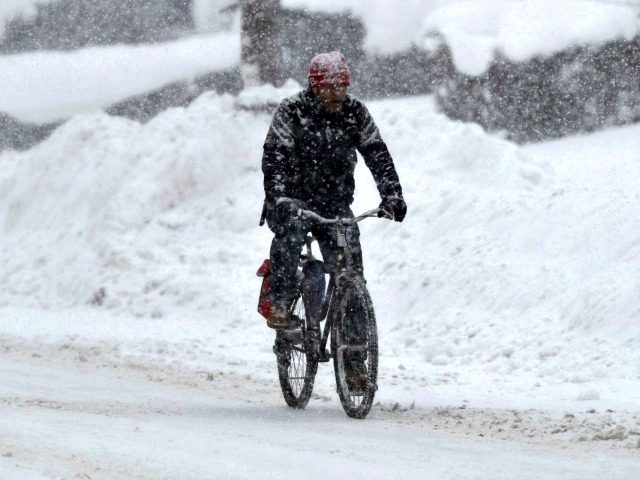Even before record-breaking cold temperatures gripped most of the United States as 2018 arrived, left-wing activists and the media were on defense, producing stories that claim cold weather has nothing — or everything — to do with global warming.
In its reporting, the Weather Channel blamed the cold snap in the U.S. on Arctic air:
A reinforcing shot of bitter, Arctic air will soon prolong the long-lived cold outbreak across the Plains, Midwest, South and East into the end of this week, likely shattering more daily records and sending wind chills to dangerously cold levels.
The first batch of Arctic air to arrive in the Lower 48 is currently gripping parts of the Midwest, South and East. This will be followed by another reinforcing shot of bitterly cold air during the latter half of the week ahead.
But you wouldn’t think the Arctic had the power to put the United States into a deep freeze if you read the Associated Press story published in mid-December:
The Arctic is running a fever. The magnitude and pace of the recent Arctic sea-ice decline and ocean warming is “unprecedented” in at least the past 1,500 years and likely much longer, according to a federal report released Tuesday by the National Oceanic and Atmospheric Administration.
The polar region shows no sign of returning to its reliably frozen state of recent decades, and its permafrost is thawing faster than ever before, the report warned.
“The Arctic is going through its most unprecedented transition in human history, and we need better observations to understand and predict how these changes will affect everyone, not just the people of the north,” Jeremy Mathis, head of NOAA’s Arctic Research Program said in the AP story. “The Arctic has traditionally been the refrigerator to the planet, but the door of the refrigerator has been left open.”
The Huffington Post ran a story headlined: “States Across U.S. See Record-Cold New Year’s Day as Rest of the World Boils:”
Huge sections of the Arctic were among the areas that saw temperatures well above average, according to the University of Maine’s Climate Reanalyzer, which compares daily temperature anomalies to a baseline of data from between 1979 and 2000.
Temperatures around the globe were nearly one full degree Fahrenheit, or 0.5 degrees Celsius, above average on Monday.
Think Progress, the website run by the far-left Center for American Progress, funded in part by George Soros, ran a story headlined: “It is abnormally cold in the United States. That doesn’t disprove global warming:”
Cold snaps are routinely used by those who do not accept the mainstream scientific consensus on climate change to support their baseless contention that global warming is a hoax.
Sen. Jim Inhofe (R-OK), one of Congress’ most outspoken climate deniers, famously brought a snowball to the Senate floor in 2015 to prove climate change isn’t real.
Then the website slammed President Donald Trump for tweeting about the weather and climate change, including the wisdom of backing out of the Paris climate accord that would have required the United States to funnel climate-change-fighting funding to other countries.
In the East, it could be the COLDEST New Year’s Eve on record. Perhaps we could use a little bit of that good old Global Warming that our Country, but not other countries, was going to pay TRILLIONS OF DOLLARS to protect against. Bundle up!
— Donald J. Trump (@realDonaldTrump) December 29, 2017
“In the East, it could be the COLDEST New Year’s Eve on record,” Trump tweeted on Dec. 28. “Perhaps we could use a little bit of that good old Global Warming that our Country, but not other countries, was going to pay TRILLIONS OF DOLLARS to protect against. Bundle up!”
Think Progress proclaimed:
While climate change won’t stop cold weather from happening, it will steadily change the behavior of the atmosphere to be warmer, on average, across the entire globe.
And that’s exactly what is happening right now, almost everywhere in the world except for the United States.
The Associated Press story included NOAA’s Mathis saying the record cold weather in the U.S. could even be related to global warming.
”There are some connections between the warming in the Arctic and the extreme weather events down here,” Mathis said.
And the Environmental Defense Fund went so far as to say it might just feel colder today than in past winters because of global warming.
“Winters in the U.S. have warmed a lot since the 1970s – making what used to be a typical winter feel even more frigid nowadays. This wintertime warming trend is most prominent in some of the coldest areas of the country, such as the Northeast and Upper Midwest.”

COMMENTS
Please let us know if you're having issues with commenting.